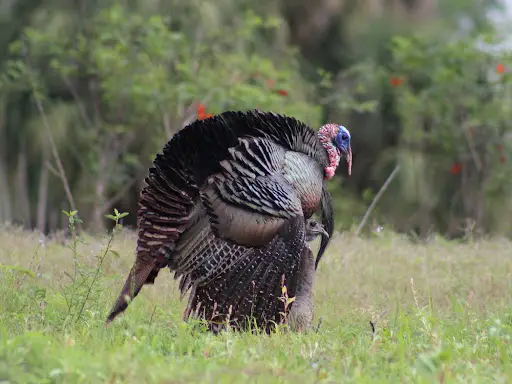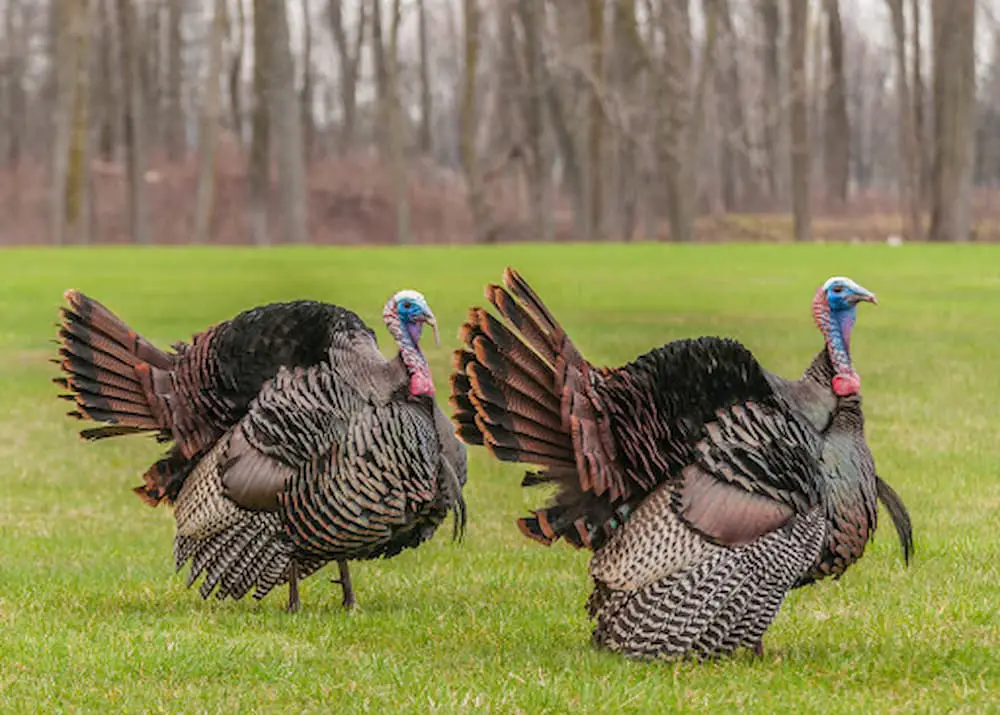Turkeys have a reputation for not being the brightest animals. Between the way their necks look and the sounds they make, it’s understandable why we think that. But how much truth is there to this? Are we underestimating turkeys?
In this article, we’ll debunk some common turkey myths, such as “do turkeys drown in the rain” to improve your appreciation of these wonderful birds.
Do turkeys drown in the rain? Turkeys don’t drown in the rain. This myth developed from turkeys’ habits of tilting their heads up and opening their beaks when it rains. While turkeys commonly engage in this behavior, they usually know when to stop and therefore don’t end up drowning.
Why Do Turkeys Randomly Look Up?
Why do turkeys seem to tilt their head back randomly? This habit is due to a disorder called tetanic torticollar spasms (TT). TT is specifically prevalent in Medium White turkeys. It causes them to have spasms, which results in tilting the neck with their beak directed upwards.
Learn how to raise your own quail and have an unlimited supply of eggs and meat.
These spasms vary in length – sometimes lasting just a second, other times lasting up to a minute, which is why people assume that turkeys end up drowning.
Research shows that turkeys usually grow out of this habit as they mature, but they may continue with it until they are 18 weeks old. That said, there have been no reports of turkeys dying from this habit.
Now that we’ve debunked the myth “do turkeys drown in the rain,” let’s look at other popular myths and clear turkeys’ names.


Other Turkey Myths
Turkeys are plagued with myths that characterize them as stupid, flightless birds. However, there is little truth to many of these myths.
Here are the most common turkey myths and the truth behind them.
Turkeys Can’t Fly
Probably the biggest myth about turkeys is that they can’t fly. In truth, while they don’t use flying as their primary mode of transportation, turkeys can indeed fly. Turkeys’ bodies are built to fly in short bursts.
Not only can turkeys fly, but they can also actually sleep in trees, where they are safe from prey. Turkeys are recorded flying as fast as 40 miles per hour. They use their short-flight abilities to get to the higher branches of trees and get a good night’s rest.
All Turkeys Gobble
Every Thanksgiving Day, you hear “gobble gobble” for a reason. It’s become what most believe to be the universal call of the turkey. However, you may be surprised to learn that not all turkeys make the classic “gobble gobble” sound.
The “gobble” sound that we’re so used to is the sound only the male turkey makes. A female turkey is called a hen and generally sounds like a hen, making a “cluck” noise or sometimes chirping like other birds.

Native Americans Introduced Turkey to Europeans on the First Thanksgiving
A narrative commonly told every Thanksgiving is how the Native Americans introduced turkey to the Europeans, which resulted in the first Thanksgiving dinner. As with many other narratives around the first Thanksgiving, this is most likely false.
Indigenous people cultivated turkey and introduced it to the Europeans, but this started happening as early as the 1500s, well before the first Thanksgiving in 1621. They brought it back to Europe and introduced it there, which was in European cuisine well before the 17th century. In fact, chances are that some of the turkeys in North America today have European ancestry!
The Verdict: Turkeys Are Smarter Than You Think
To recap, the answer to “do turkeys drown in the rain” is no, they don’t. In fact, turkeys are much more intelligent than we give them credit for.
Hopefully, these new turkey facts give you something to discuss during this year’s Thanksgiving dinner!

